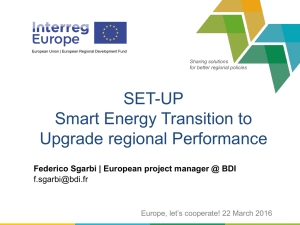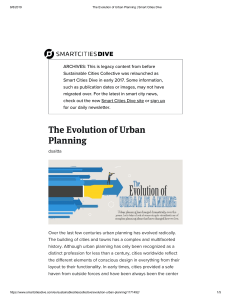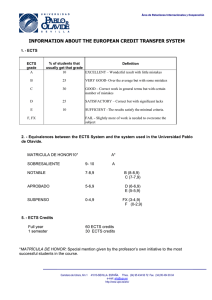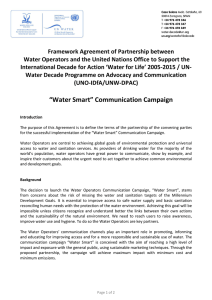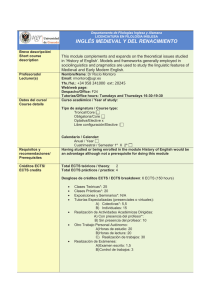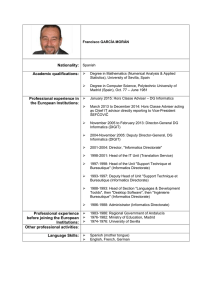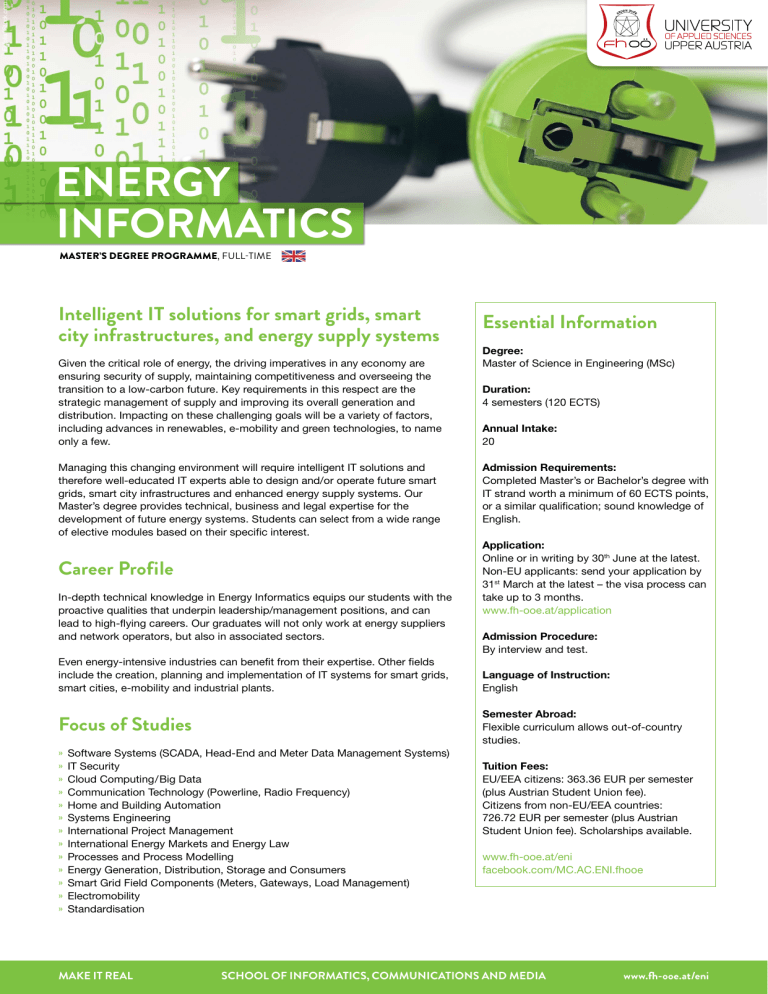
Fofolia/iStock.com ENERGY INFORMATICS MASTER’S DEGREE PROGRAMME, FULL-TIME Intelligent IT solutions for smart grids, smart city infrastructures, and energy supply systems Given the critical role of energy, the driving imperatives in any economy are ensuring security of supply, maintaining competitiveness and overseeing the transition to a low-carbon future. Key requirements in this respect are the strategic management of supply and improving its overall generation and distribution. Impacting on these challenging goals will be a variety of factors, including advances in renewables, e-mobility and green technologies, to name only a few. Managing this changing environment will require intelligent IT solutions and therefore well-educated IT experts able to design and/or operate future smart grids, smart city infrastructures and enhanced energy supply systems. Our Master’s degree provides technical, business and legal expertise for the development of future energy systems. Students can select from a wide range of elective modules based on their specific interest. Career Profile In-depth technical knowledge in Energy Informatics equips our students with the proactive qualities that underpin leadership/management positions, and can lead to high-flying careers. Our graduates will not only work at energy suppliers and network operators, but also in associated sectors. Even energy-intensive industries can benefit from their expertise. Other fields include the creation, planning and implementation of IT systems for smart grids, smart cities, e-mobility and industrial plants. Degree: Master of Science in Engineering (MSc) Duration: 4 semesters (120 ECTS) Annual Intake: 20 Admission Requirements: Completed Master’s or Bachelor’s degree with IT strand worth a minimum of 60 ECTS points, or a similar qualification; sound knowledge of English. Application: Online or in writing by 30th June at the latest. Non-EU applicants: send your application by 31st March at the latest – the visa process can take up to 3 months. www.fh-ooe.at/application Admission Procedure: By interview and test. Language of Instruction: English Semester Abroad: Flexible curriculum allows out-of-country studies. Focus of Studies »Software Systems (SCADA, Head-End and Meter Data Management Systems) » IT Security » Cloud Computing / Big Data » Communication Technology (Powerline, Radio Frequency) » Home and Building Automation » Systems Engineering » International Project Management » International Energy Markets and Energy Law » Processes and Process Modelling » Energy Generation, Distribution, Storage and Consumers » Smart Grid Field Components (Meters, Gateways, Load Management) » Electromobility » Standardisation MAKE IT REAL Essential Information Tuition Fees: EU/EEA citizens: 363.36 EUR per semester (plus Austrian Student Union fee). Citizens from non-EU/EEA countries: 726.72 EUR per semester (plus Austrian Student Union fee). Scholarships available. www.fh-ooe.at/eni facebook.com/MC.AC.ENI.fhooe SCHOOL OF INFORMATICS, COMMUNICATIONS AND MEDIA www.fh-ooe.at/eni Curriculum Energy is the underlying heartbeat of the global economy – a critical factor in the production of nearly all goods and services in the modern world. Clearly, energy informatics – the application of information technology in this highly demanding field – is the key to securing its supply and achieving a sustainable future. Prof. Dr. Christoph Schaffer, Head of Studies Projects and Research Practical know-how is critical in this demanding field, therefore our curriculum was developed with leading IT companies in the smart grid business. Our R&D activities focus on providing intelligent energy services and investigating scalability aspects in a smart grid environment under given constraints (data rate, security, costs etc.). Study Abroad Our flexible curriculum allows out-of-country studies. This degree is taught entirely in English, thus also equipping our students with the language and intercultural skills necessary to succeed in the increasingly internationallyoriented energy industry. ECTS credits per semester 1 2 3 4 List of Courses Communication Technology International Energy Markets and Energy Law Physics Processes and Process Modelling Systems Engineering I: Fundamentals Energy Generation, Distribution and Storage International Project Management IT Security Smart Grid Field Components Software Systems I Cloud Computing/Big Data Energy Consumers Home and Building Automation 5 5 5 5 5 5 5 5 5 5 5 5 5 Master’s Thesis Project 4 Scientific Working Software Systems II: SCADA Master’s Thesis Master’s Thesis Seminar Elective Courses*: Design of Eco-Feedback Electromobility Numeric and Heuristic Optimization Project Software Architectures and Patterns Systems Engineering II: Metrics and Testing 1 5 24 1 5 5 5 5 Note: Students have to achieve a minimum of 120 ECTS credits in total (30 ECTS credits per semester). The main language of instruction on this degree programme is English, thus a sound knowledge of the language is essential. * One elective course has to be chosen each semester (also courses being offered by other Master’s degree programmes can be selected) Did you know that ... Contact ... most European countries have already started their smart metering roll-outs or will start them very soon? Or that smart meters are only one small aspect within the grid when it comes to the transformation into smart grids? Head of Studies: Prof. Dr. Christoph Schaffer University of Applied Sciences Upper Austria School of Informatics, Communications and Media Softwarepark 11, 4232 Hagenberg/Austria Phone: +43 50804 22800 Email: eni@fh-hagenberg.at www.fh-ooe.at/eni | facebook.com/MC.AC.ENI.fhooe 09/2018 MAKE IT REAL HAGENBERG CAMPUS www.fh-ooe.at/eni
